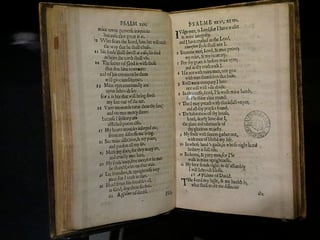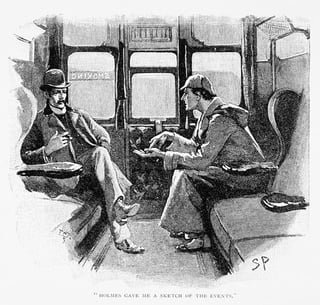As the old saying goes: ‘It pays to be first.’
In the world of rare book collecting, this is also a well-known fact. First editions. First printing. First drafts of manuscripts. These are usually the kinds of 'firsts' book collectors are on the look-out for when evaluating a book’s worth and value, and it’s these elements that factor largely into how much rare books fetch at auction and how sought-after they become.
However, the concept of primacy, or being recognized as the first incarnation of something within the literary canon, goes well beyond the simple notion of first editions or first printings. First mentions of a character, a setting, a theory, an idea, or even the first location where a book was printed all factor into the primacy of a book and are important elements book collectors and evaluators must weigh when determining a book’s worth and value.
It may sound like a strange concept and one that can be difficult to grasp—for example, a book recognized as the first to be printed and distributed in the state of Delaware is highly-prized just because of its history as the first in that state. So in order to help clarify primacy and examine just how it factors into the rarity and collectability of a book, here are a few examples of primacy in the book collecting world.
The Bay Psalm Book (Location)
 First published in 1640 in Cambridge, Massachusetts by colonist Stephen Daye, The Bay Psalm Book, also know as The Whole Booke of Psalmes Faithfully Translated into English Metre, was the first book to be published and distributed in the original American colonies. Consisting mainly of translations from Latin and other iterations, the book contained a number of classic, well-known psalms early colonists used in church and other religiously-affiliated ceremonies. Being the first book known to be published on any kind of mass level in the original colonies, it is perhaps the rarest book in the American rare book landscape. While the book went into eight subsequent printings, only 5 complete copies remain with another 6 partial copies also in existence. The last copy sold at auction was in November 2013 for $14.2 million, a record for a printed book.
First published in 1640 in Cambridge, Massachusetts by colonist Stephen Daye, The Bay Psalm Book, also know as The Whole Booke of Psalmes Faithfully Translated into English Metre, was the first book to be published and distributed in the original American colonies. Consisting mainly of translations from Latin and other iterations, the book contained a number of classic, well-known psalms early colonists used in church and other religiously-affiliated ceremonies. Being the first book known to be published on any kind of mass level in the original colonies, it is perhaps the rarest book in the American rare book landscape. While the book went into eight subsequent printings, only 5 complete copies remain with another 6 partial copies also in existence. The last copy sold at auction was in November 2013 for $14.2 million, a record for a printed book.
The Adventure of the Final Problem (First character reference)
 Moriarty. He’s perhaps one of the most feared, well-known villains in the English literary canon, so much so he need only be referred to by his last name alone. Sherlock Holmes' most infamous nemesis, Moriarty made his first and only appearance in the story The Adventure of the Final Problem in which the two face-off in an epic struggle atop the Reichenbach Falls before plummeting to their deaths—or, as in the case of Holmes, so we think. The first appearance of such a crucial character is another classic example of primacy in literature and one that can significantly increase the value of a certain volume. In the case of Holmes, because The Adventure of the Final Problem is the first and only physical appearance Moriarty makes in the Sherlock Holmes stories, copies of this story would be a great value for rare book collectors given the impact Moriarty continues to have on Holmes and his narrative arc even after his death.
Moriarty. He’s perhaps one of the most feared, well-known villains in the English literary canon, so much so he need only be referred to by his last name alone. Sherlock Holmes' most infamous nemesis, Moriarty made his first and only appearance in the story The Adventure of the Final Problem in which the two face-off in an epic struggle atop the Reichenbach Falls before plummeting to their deaths—or, as in the case of Holmes, so we think. The first appearance of such a crucial character is another classic example of primacy in literature and one that can significantly increase the value of a certain volume. In the case of Holmes, because The Adventure of the Final Problem is the first and only physical appearance Moriarty makes in the Sherlock Holmes stories, copies of this story would be a great value for rare book collectors given the impact Moriarty continues to have on Holmes and his narrative arc even after his death.
The Roswell Incident (Theory/idea)
It’s well-traveled thematic territory now, but in 1980 written accounts and dissections of a suspected alien landing in the deserts of New Mexico in the 1940s was something of a novel idea. In fact, the 1980 book The Roswell Incident by UFO researchers Charles Berlitz and William Moore is widely recognized as the first book-length work on the Roswell incident, the investigation, and the subsequent theories about a government cover-up. For those book collectors interested in UFO-related material, the primacy value of The Roswell Incident is quite high given it was the first book on the scene, and it inspired a host of other books on what may have occurred in Roswell, New Mexico. As with the other examples, primacy in idea or theory can in some cases outweigh the condition of the actual book, especially if the idea is of great import to society or a specific segment of literary culture.








